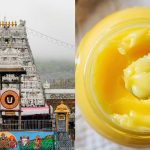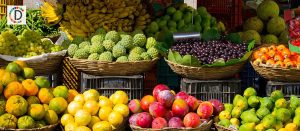
Delhi-based chemical dealer arrested for allegedly supplying ₹250 cr in palm-oil-based fake ghee to TTD via the Bholebaba Dairy network (2019-2024).
The Special Investigation Team (SIT), probing the massive ghee adulteration case linked to the Tirumala Tirupati Devasthanams (TTD), achieved a key breakthrough with the arrest of Ajay Kumar Sugandha, a Delhi-based chemical trader. Named A-16 in the case, Sugandha is accused of supplying the crucial chemicals required for manufacturing the adulterated ghee. The investigation, which spans the period from 2019 to 2024, has unveiled a large-scale fraud where an estimated 68 lakh kilograms of fake product were supplied to the Tirupati temple for use in the preparation of the sacred Laddu prasadam.
The SIT’s remand report detailed the chemical concoction used to create the fake ghee that was sold to the TTD. The adulterated product was allegedly made by blending a mix of palm oil, palm kernel oil, and palmolein. To ensure the synthetic product could pass superficial checks and mimic the real thing, it was then fortified with chemicals such as beta-carotene, acetic acid ester, and artificial ghee flavor. Crucially, lab tests conducted by the NDDB CALF confirmed that samples collected by the TTD were primarily a mix of palm-based oils, rather than the expected pure ghee.
The investigation directly links the scam to the Bholebaba Dairy network, an Uttarakhand-based entity. The SIT report emphatically states that this dairy never produced milk, yet it successfully managed to route and supply millions of kilograms of the counterfeit product to the TTD. The scale of the fraud is substantial, with the report estimating that 68.17 lakh kg of adulterated ghee, valued at over ₹251 crore, was produced. Of this, 37.38 lakh kg (worth ₹137 crore) was allegedly supplied to a dairy that subsequently contracted with the TTD between 2022 and 2025.
Further evidence supporting the chemical supplier’s role was uncovered during a search of a Delhi godown linked to Ajay Kumar Sugandha. The SIT found blue drums with peeled-off labels and stickers indicating the presence of imported monoglycerides from South Korea, suggesting the source of the synthetic components used to formulate the adulterated mix. This confirms the sophisticated, chemical-based nature of the food fraud operation.
The arrest of the Delhi-based trader underscores the gravity of the case, which has shaken the integrity of one of India’s most important religious institutions. The SIT’s findings highlighted that the TTD had floated an e-tender in March 2024 for 10 lakh kg of cow ghee, which was won by a Dindigul-based dairy at a price of ₹319.80 per kg, a rate investigators deemed “unviable” for pure ghee. This low-cost bid allowed the fraudulent, palm-oil-based product to enter the supply chain, though later samples confirmed the vegetable and animal-fat adulteration.
Source: Review the full details of the investigation and the trader’s arrest from PGurus.
You can now read the most important #news on #eDairyNews #Whatsapp channels!!!
🇮🇳 eDairy News ÍNDIA: https://whatsapp.com/channel/0029VaPidCcGpLHImBQk6x1F

















